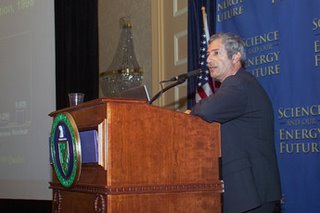THEY SAY HE’S GOING TO…HE DOES…AND HERE’S WHY:
THEY SAY HE’S GOING TO: Bush to speed up alternative energy push: paper
September 29, 2006 (Reuters via Yahoo News)
- President Bush said he would speed up his alternative energy push during the remainder of his term, with new spending focused on easing bottlenecks that are slowing the spread of ethanol in the market, The Wall Street Journal reported on Friday...

HE DOES: Bush pushes 'energy diversification' to wean US from oil
September 29, 2006 (AFP via Yahoo News)
The US is to put more funding into energy research, especially the development of ethanol, to end its reliance on oil, President George W. Bush said in an interview...
- Outlining his energy policy for his closing two years in office, Bush said more government money would be spent "to accelerate that which is possible," including making ethanol more widespread as a substitute for gasoline...
- His ultimate "vision" in energy conservation, Bush said, was developing the hydrogen-powered automobile because "it's clean. It deals with the warming issue."
However, he dispelled rumors that the government might follow California's example by imposing direct regulations on greenhouse gas emissions, which contribute to global warming...
AND HERE’S WHY: Climate demands rapid energy conversion, experts say
Martin LaMonica, September 29, 2006 (CNET News.com)
- A panel of energy experts called on industry and government to rapidly embrace technologies that reduce greenhouse gas emissions, including renewable energy, energy efficiency and carbon sequestration.
- Growing energy demand, notably from developing nations such as India and China, coupled with climate change caused by global warming have created a situation that requires both technology and new government policies, panelists [on a Massachusetts Institute of Technology “Innovation and the Energy Crisis” panel] said.
- [M]oderator Robert C. Armstrong, an MIT professor of chemical engineering and the co-director of the MIT Energy Research Council: "The energy infrastructure turnover is on the order of 50 years certainly or greater, driven by the enormous infrastructure and capital costs involved…These are grand challenges that involve science, technology and policy."

Joseph Romm [founder/executive director for the Center for Energy & Climate Solutions and a former director of Energy Efficiency and Renewable Energy at the U.S. Department of Energy]: "The answer is we should spend every last dime on technology available today and technology available in the next five years. All the technology in the world won't be worth anything if we don't act now…[science around global warming] has gotten incredibly solid and alarming…"
- Nathan Lewis, professor at the California Institute of Technology: "This is no longer about science. This is about risk management…If we don't solve this problem in the next 20 years, pure and simple from a scientific point of view, the world will never be the same."

- Lewis said that the scale of shifting the energy infrastructure away from fossil fuels while meeting growing demand worldwide means that people should focus on techniques that will have the biggest impact on reducing greenhouse gases, notably those involving carbon dioxide...He advocated conservation efforts to reduce energy consumption. But even with those, the planet has only "four cards" left to consider when addressing a problem of this scale, Lewis argued...He recommended "clean coal," where carbon dioxide from coal is captured during extraction and sequestered underground or at the bottom of the sea to reduce its impact on the atmosphere.
He also advocated nuclear power at a large scale. And he urged use of solar electricity and cheap storage of renewable energy through chemical fuels.
All panelists called on the federal government to establish policies to curb greenhouse gas emissions...
Pick the square for President Bush, the square for the academics and the square you belong in.








0 Comments:
Post a Comment
<< Home